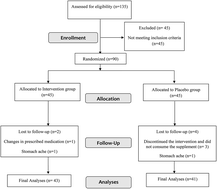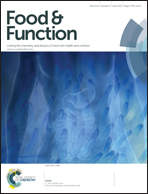Effects of Nigella sativa oil with a low-calorie diet on cardiometabolic risk factors in obese women: a randomized controlled clinical trial
Abstract
Obesity is typically associated with increased risk factors of cardiovascular diseases (CVDs). Therefore, a therapeutic approach that aims to control body weight and metabolic profile might be effective in preventing CVDs. We aimed to determine the effects of Nigella Sativa (NS) oil with a low-calorie diet on cardiometabolic risk factors in obese women. In this double-blind randomized controlled clinical trial, 90 obese women were recruited. Participants were females aged 25–50 years old with body mass index (BMI) between 30 and 35 kg m−2. They were randomly assigned to receive a low-calorie diet with 3 g per day (1 g before each meal) NS oil or placebo for 8 weeks. Anthropometric indices, dietary intake and biochemical parameters were measured at the baseline and after the intervention. Eighty-four females completed the trial (intervention n = 43, placebo n = 41). Two groups were similar in the baseline characteristics. After the intervention, dietary intake was changed in both groups compared to the baseline, but the differences were not significant between the two groups. In the NS group, weight (−6.0 vs. −3.6%; p < 0.01) and waist circumference (−6.9 vs. −3.4%; p < 0.01) decreased significantly compared with the placebo group at the end of the trial. Comparison of biochemical parameters presented a significant decline in triglyceride (−14.0 vs. 1.4%; p = 0.02) and very low density lipoprotein (−14.0 vs. 7%; p < 0.01) levels in the NS group compared to the placebo group. NS oil concurrent with a low-calorie diet can reduce cardiometabolic risk factors in obese women. However, more clinical trials are needed to elucidate efficacy of NS as a complementary therapy in obese subjects.


 Please wait while we load your content...
Please wait while we load your content...